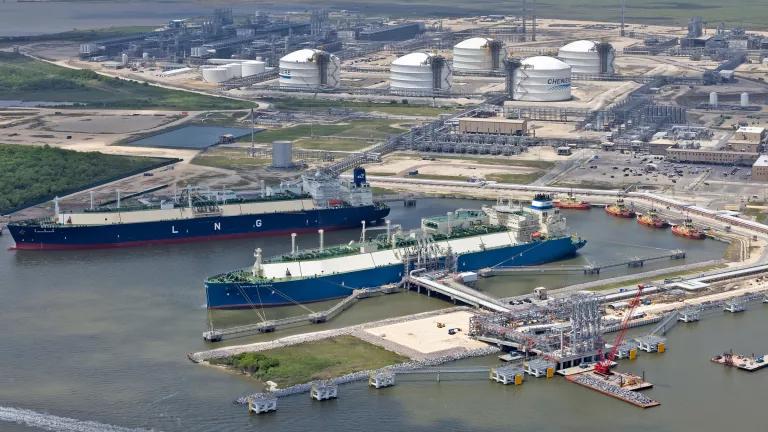The Biden Administration Will Boost Global Climate Action
At its heart, his vision includes a commitment to integrate climate change as a core U.S. foreign policy and trade priority.

Joe Biden at the Plymouth Area Renewable Energy Initiative, June 2019, in Plymouth, N.H.
Elise Amendola/Associated Press
President-elect Biden ran on a bold and comprehensive set of promises to rally the world to meet the climate challenge. At its heart, his vision includes a commitment to integrate climate change as a core U.S. foreign policy and trade priority. This will be a stark, positive, and welcome shift from the last four years.
Three key international climate promises
Biden’s core international climate promises fall into three key areas.
The first is reinvigorating U.S. global climate leadership and diplomacy, starting by rejoining the Paris Agreement on day one. But Biden has said he will go well beyond that to “challenge every other country to up the ante on climate commitments.”
The second key area of his promises are to shift global investments away from fossil fuels and toward clean energy. Biden has committed to “[stop] financing dirty energy” and to “demand a worldwide ban on fossil fuel subsidies.”
The third and final key area of Biden’s international climate promises are advancing nature-based solutions to climate change. His plan commits to advance global efforts to combat both the climate crisis and the nature crisis by conserving 30% of America’s lands and waters by 2030.
The imperative for American global climate leadership
The U.S. and the world are at a critical inflection point in tackling the climate crisis. We must be bolder, more innovative, and deploy action more widely in order to effectively meet the challenge. After decades of inadequate action by the international community and four years of the U.S. abdicating its leadership role, climate change now poses a clear and imminent threat to the prosperity, security, and well-being of virtually everyone on Earth. That threat is here today.
Only a focused and ambitious global response can avert the worst climate impacts in the narrowing window of time to act. And as the last four years have demonstrated, American global leadership is critical to mobilize action at the required scale and pace.
Addressing the climate crisis as a central organizing principle of U.S. foreign policy
To advance its international climate agenda, the Biden administration can make addressing the climate crisis a central organizing principle of U.S. foreign policy, as leading U.S. climate experts have recommended. This includes using every tool of American foreign policy to push the rest of the world to raise their ambitions—curbing greenhouse gas emissions and accelerating clean energy—alongside the United States.
Delivering on the first key area of President Biden’s promise requires the structure, personnel, strategy, and tools to drive climate action commensurate with its status as a central U.S foreign policy priority. This will require making climate change a top tier component in every aspect of America’s foreign policy engagement and urgently driving the necessary actions that flow from that prioritization.
Such prioritization includes mainstreaming the international climate efforts across the U.S. government to “non-traditional” realms, including economic, trade, security, development, and political affairs. It also means more assertively deploying an expanded toolkit—including carrots and sticks—to provide incentives for the international community to enhance their climate actions and hold those who hang back accountable. And it means that all key foreign policy decisions should be taken with full consideration of their climate implications.
Delivering on the second key area of Biden’s promise requires a phase-out of U.S. support for overseas fossil fuel investments and projects, instead prioritizing clean energy deployment. This can be achieved by establishing a “Clean Growth First” policy agenda for U.S. overseas public investments.
The Biden administration can advance a “Clean Growth First” agenda across all U.S. development finance and export credit agencies in order to phase out fossil fuels investments and project support abroad. The administration can also leverage the U.S.’s capacity to massively ramp up assistance for clean energy infrastructure, including for distributed renewable energy and energy access that help alleviate poverty and promote social equity.
To implement the third and final area of Biden’s key promises, the U.S. can internationalize its domestic commitments to safeguard nature. That includes using the administration’s diplomatic influence and foreign assistance to set and achieve a global goal to fully and highly protect at least 30% of the global ocean and 30% of global land and inland waters by 2030.
Advancing this agenda will require strong bilateral engagement with key countries—including China, Brazil, and Canada—as well as the use of carrots and sticks in order to secure meaningful protections that prioritize Indigenous-led protection and management.
Protecting sufficient ocean and land areas that are effectively and equitably managed, ecologically representative, and well-connected is the most important step we can take to reverse nature’s decline. Such protections are also critical for the integrity of key ecosystems that draw down significant amounts of carbon from the atmosphere.
And the Biden administration will have a once-in-a-decade opportunity to advance progress with the international community set to adopt new global targets for nature protection in 2021 through the U.N. Convention on Biological Diversity.
Translating Biden’s promises into action
Now is the time for the incoming Biden administration to translate its bold set of promises into leadership and concrete action. The urgency of addressing the climate and nature crises have become even more starkly evident over the last four years. At the same time, solutions like deploying wind and solar energy have become cheaper, more readily available, and more urgently needed to address the impacts that hit the most vulnerable and marginalized populations around the world first and hardest.
Marshaling the full weight of the Biden administration’s foreign policy is the single biggest lever to accelerate the global transition to zero emissions. Biden’s leadership can simultaneously protect us from the ravages of climate change, reduce the fossil fuel pollution that is inequitably harming our health, build clean economic opportunities at home and abroad, and secure the integrity of the natural world upon which we all depend.
That’s an international climate agenda worth getting behind, for all of us.
*NRDC staffers Jake Schmidt, Han Chen, Lisa Speer, and Zak Smith contributed to this blog.




